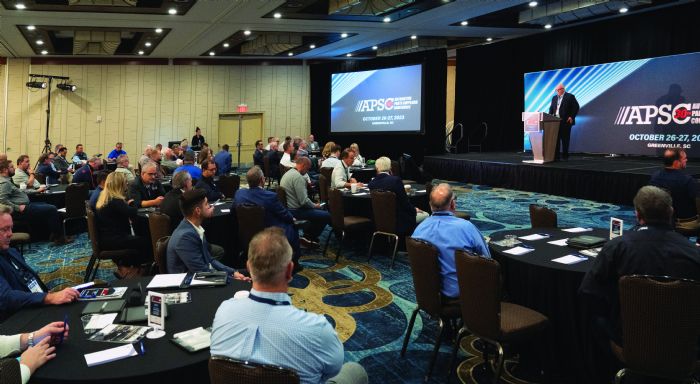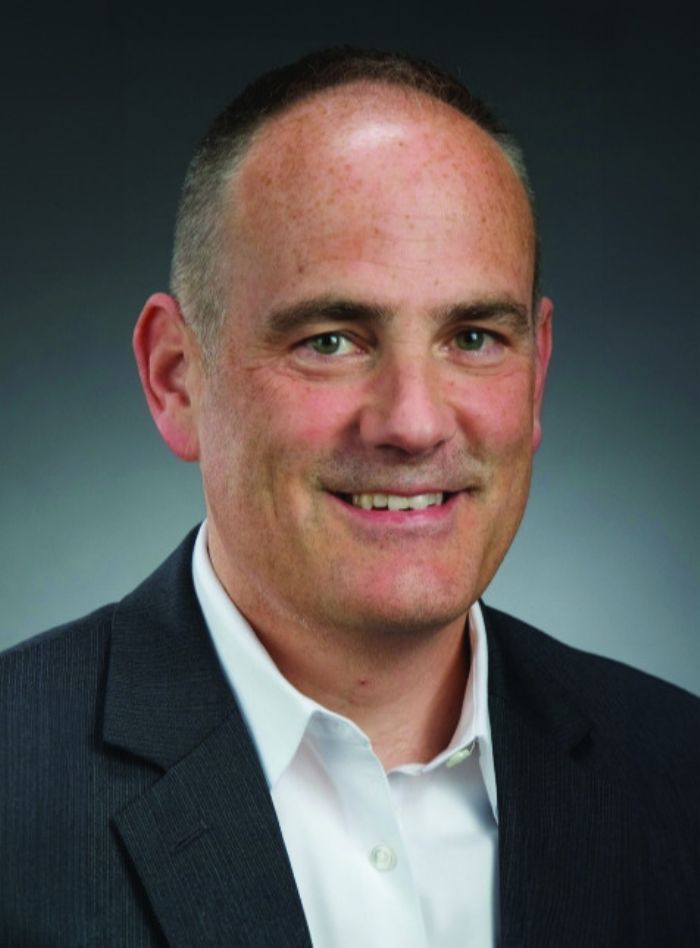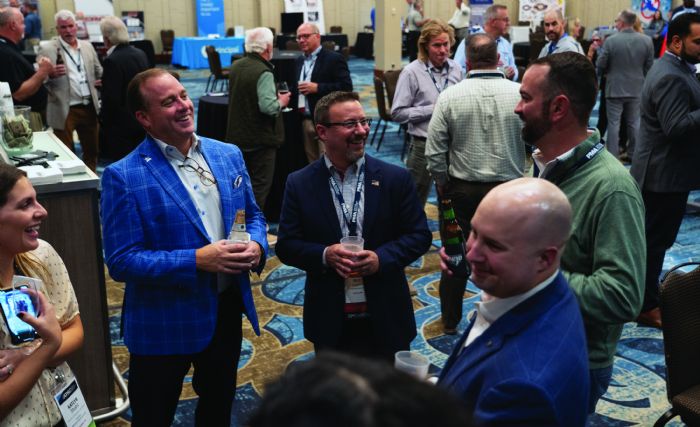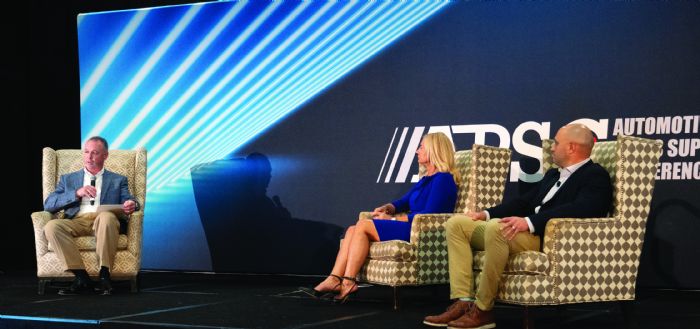 “Supplying the automotive industry never comes without challenges, of course, but today the challenges and uncertainty are greater than ever,” says David Klotz, PMA president. “From the uneven move toward electrification to the pressures of time-sensitive part and component delivery, all while trying to maintain a profit margin that makes supply worthwhile,, the industry is riding a roller coaster. These challenges require an informed supplier community that can adapt quickly and correctly. For more than 30 years, APSC has been providing the knowledge and networking opportunities that make such decision making possible, and this year’s information-packed schedule continues in that tradition. Simply put, APSC is a must-attend signature event.”
“Supplying the automotive industry never comes without challenges, of course, but today the challenges and uncertainty are greater than ever,” says David Klotz, PMA president. “From the uneven move toward electrification to the pressures of time-sensitive part and component delivery, all while trying to maintain a profit margin that makes supply worthwhile,, the industry is riding a roller coaster. These challenges require an informed supplier community that can adapt quickly and correctly. For more than 30 years, APSC has been providing the knowledge and networking opportunities that make such decision making possible, and this year’s information-packed schedule continues in that tradition. Simply put, APSC is a must-attend signature event.”
Detailed State of the Industry
 APSC 2024 kicks off on Wednesday, September 11, with the opening keynote, a presentation on the state of the automotive industry by Jeff Schuster, group head and executive vice president automotive for GlobalData, parent organization of LMC Automotive. A late-July joint forecast from J.D. Power and GlobalData offers that U.S. new-vehicle sales for July 2024 are projected to reach nearly 1.35 million units, an increase of 2.8% from July 2023. Total U.S. new-vehicle sales at a seasonally adjusted annualized rate (SAAR) are expected to reach 16.7 million units, a 0.7-million-unit increase from July 2023 and the highest SAAR in more than 3 yr. Trucks and SUVs are expected to account for 79.9% of new-vehicle retail sales in July 2024.
APSC 2024 kicks off on Wednesday, September 11, with the opening keynote, a presentation on the state of the automotive industry by Jeff Schuster, group head and executive vice president automotive for GlobalData, parent organization of LMC Automotive. A late-July joint forecast from J.D. Power and GlobalData offers that U.S. new-vehicle sales for July 2024 are projected to reach nearly 1.35 million units, an increase of 2.8% from July 2023. Total U.S. new-vehicle sales at a seasonally adjusted annualized rate (SAAR) are expected to reach 16.7 million units, a 0.7-million-unit increase from July 2023 and the highest SAAR in more than 3 yr. Trucks and SUVs are expected to account for 79.9% of new-vehicle retail sales in July 2024.
Globally, the light-vehicle selling rate “reached a milestone in June, hitting 89.7 million units,” says Schuster. “This marks the highest level of the year and is a significant increase of 2 million units from May. Despite slightly falling below expectations, the industry continues to show resilience and growth. That said, June fell short of June 2023 by nearly 2 million units.
“July is looking to post the strongest selling rate of the year,” he continues, “exceeding a 92-million-unit selling rate. Positive year-over-year (YoY) growth of 3% is projected, with China and Japan returning to neutral volume levels. Europe and North America are each expected to grow more than 3%. (We’ve revised the 2024 global market) slightly downward again by 200,000 units, with the forecast now standing at 88.7 million units, a 2.2% increase from 2023. Despite the adjustments, 2024 remains on track to be a strong year for auto sales, with anticipated rate cuts and pricing reductions creating a positive atmosphere for consumers.”
Specific to the EV world market, a June GlobalData forecast webinar counts 25 million EV units (including hybrids) as of 2023, compared to 6 million units in 2018. GlobalData expects the market to double from 2023 to 2028. As for market share, EVs (again, including hybrids) held a 10% share in 2019 and rose to 30% in 2023. Expect a 60% share by 2030.
Near term, the July joint forecast from J.D. Power and GlobalData points to EV adoption growing, but at a slower pace.
 “While premium segment retail sales are down 13%—driven by Tesla’s 22% decline—the mass market segment is up 63%,” offers Elizabeth Krear, vice president, electric vehicle practice at J.D. Power, in the forecast. “This is primarily due to increasing product availability. As availability and affordability continue improving in the mass market segment, EVs will attract more mainstream shoppers, but growth in charging infrastructure remains a critical part of the equation. The J.D. Power EV retail share forecast for 2024 has been reduced to 9% from 12%. Mass market shoppers need confidence that price parity will stick, and that charging accessibility will continue to improve.”
“While premium segment retail sales are down 13%—driven by Tesla’s 22% decline—the mass market segment is up 63%,” offers Elizabeth Krear, vice president, electric vehicle practice at J.D. Power, in the forecast. “This is primarily due to increasing product availability. As availability and affordability continue improving in the mass market segment, EVs will attract more mainstream shoppers, but growth in charging infrastructure remains a critical part of the equation. The J.D. Power EV retail share forecast for 2024 has been reduced to 9% from 12%. Mass market shoppers need confidence that price parity will stick, and that charging accessibility will continue to improve.”
The commercial-vehicle sector goes under the microscope during the afternoon of September 11, as James Taylor, executive sales director, North America, for Cummins-Meritor, presents Evolving Trends in the Commercial Vehicle Sector. He’ll have plenty to discuss, as this sector, according to 2024 second-quarter data gathered and analyzed by Work Truck Solutions, exhibits slowing of new-vehicle sales to the tune of 4.8% quarter over quarter (QoQ) and 7.3% YoY, yet sales of new hybrid/electric work truck and vans increased 35% QoQ and 28.6% YoY. And, new-vehicle dealer inventories continue to rise following the pandemic—9.7% QoQ and a whopping 66.6% YoY. Interestingly, stocks of hybrid/electric work trucks and vans decreased 46.5% QoQ and 25.8% YoY.
“Although inventory is not back to pre-pandemic levels, we’re seeing indicators that suggest a run toward a buyer’s market is in the making,” says Aaron Johnson, CEO of Work Truck Solutions. “We can reasonably expect these trends to continue. Of course, all of this is subject to emerging local and international affairs, which impact trajectories. And, with many OEMs producing fewer EVs, and sales spiking over the last quarter as buyers take advantage of government incentives, we’ll have to watch to see if this becomes a pronounced trend following the November elections.”
 How will all of this vehicle information affect the supply chain? APSC 2024 has this covered, as day one ends with a roundtable discussion: the Ever-Evolving Automotive Supply Chain. Steve Horaney, vice president of sales and membership for MEMA Original Equipment Suppliers, moderates this lively session that tackles forecast numbers, the political environment, finding skilled workers, automotive-customer requirements, when to invest, material supplies and much more. Panelists include Michael Alcala, vice chair and CEO of GNS North America; Ben Barnett, president of Principal Mfg. Corp.; and Steve Wybo, senior managing director and automotive practice group leader at Riveron.
How will all of this vehicle information affect the supply chain? APSC 2024 has this covered, as day one ends with a roundtable discussion: the Ever-Evolving Automotive Supply Chain. Steve Horaney, vice president of sales and membership for MEMA Original Equipment Suppliers, moderates this lively session that tackles forecast numbers, the political environment, finding skilled workers, automotive-customer requirements, when to invest, material supplies and much more. Panelists include Michael Alcala, vice chair and CEO of GNS North America; Ben Barnett, president of Principal Mfg. Corp.; and Steve Wybo, senior managing director and automotive practice group leader at Riveron.
“After the 4 yr. of choppy waters we experienced from the Covid crisis, the industry has been fairly stable since settlement of the UAW strikes this past fall,” says Wybo. “We are, however, starting to see signs of distress with low EV demand, high inventory levels on the dealership lots, pricing pressure from the OEMs to reduce component-part costs, and economic uncertainty going into the election. We will discuss some of these challenges and ways that suppliers can weather the next ‘storm on the horizon.’”
With the expected storms, auto suppliers must learn to adapt, survive and thrive. A day-two presentation, The Times are Changing … What is Your Plan for Survival, by Sandy Munro, CEO of Munro & Associates, Inc., continues the theme of assessing challenges and formulating strategies.
“One year ago,” Munro offers, “OEMs were scrambling to get EVs into the market, but then they switched back to ICE. Now it’s hybrids. If the OEMs can’t decide, what is the tier community supposed to do?”
Tune in as Munro provides suggestions as to the opportunities available for suppliers.
Gigacasting, Robotics and AI
Expert presentations rounding out the APSC 2024 schedule promise to provide insight into technologies affecting automotive supply as well as ever-present legal issues.
Learn details on gigacasting as well as the process’ impact via a day-one presentation, Navigating New Roads: Gigacastings Driving Change in Automotive Manufacturing, by Randy Beals, global engineering specialist with Magna International.
“The automotive industry is navigating a transformative phase in manufacturing, challenged by Tesla’s gigacasting technology that represents a paradigm shift in vehicle design and production that reduces assembly time and cost,” Beals summarizes. “Since Tesla introduced the technology in 2020, it has been adopted by automakers such as Toyota and Volvo, and has been notably embraced by China EV OEMs such as Geely, Nio and XPeng. However, this technology is still relatively new with significant engineering challenges and uncertainties that must be addressed before its economic advantages can be compared reliably against the equally ginormous capital investment. In addition, there are concerns about repair and insurance costs associated with replacing entire underbodies. A growing debate surrounds a hybrid approach integrating three-piece aluminum ‘megacastings’ joined for vehicle underbodies, including components for battery storage to allow more focus on cost containment, casting quality and operational stability.”
Following on day one: Reimagining Automotive Manufacturing with Robotics and AI, presented by Colton Sampson, director of business development and partnerships for Machina Labs. This offering details software-defined factories that simplify hardware manufacturing to rapidly produce sustainable and economically viable products with a click of a mouse rather than extensive hardware changes to tooling and machinery. And, Sampson explores dieless production with robotics and AI that enable aftermarket parts and low-volume product variants deemed cost-prohibitive when using traditional stamping.
“In automotive, a new physical product requires a custom factory every time,” he says. “What if a robotic platform could create custom-to-order panels that fit on readily available platforms—a Tundra, F-150 or RAM 1500 base? This is what Machina’s Robocraftsman platform is working to accomplish.”
Legal Issues and More
Day two of APSC 2024 opens with event veteran Dan Sharkey, partner of Brooks Wilkins Sharkey & Turco PLLC offering his legal discussion—an attendee favorite.
“As the daily headlines attest,” Sharkey says, “the legal issues facing suppliers have never been hotter.”
As managing partner of the firm that defends many of the lawsuits that Stellantis/FCA has filed against suppliers, Sharkey will answer questions on that topic, on pricing and economic issues, the recent advent of aggressive warranty debits against suppliers, and more. As he says: “Please feel free to fire away!”
Wrapping up day two and concluding APSC 2024: From Skepticism to Enthusiasm—BorgWarner’s Sales Intelligence Management Transformation. This presentation, by Bucky Strong, CEO of Tohoom, and Denis Wills, head of global sales for Borgwarner Emissions Systems of Michigan Inc., provides an in-depth exploration of how BorgWarner successfully transformed its approach to sales-intelligence management.
“By adopting the Tohoom Commercial Intelligence Management system, BorgWarner increased efficiencies in handling the complexities of global OEM customers,” says Strong. “Under Denis Wills’ leadership, the implementation spanned all business units, sales teams and manufacturing facilities, integrating capabilities such as long-range planning, volume and pricing management, and win/loss analysis.”
Attendees will discover the cultural shift within BorgWarner that turned initial skepticism into enthusiastic acceptance of new technology, along with real-world examples of how this transformation has driven efficiency and performance improvements in dealing with global OEM customers.
The APSC 2024 schedule dives deep into automotive-supplier issues and technologies—a big reason why this event has lasted for 30-plus years. Join peers and professionals for two days of learning, networking and fun in Pontiac. For details and to register, visit www.pma.org/apsc. MF
See also: Precision Metalforming Association
Technologies: Management







 “Supplying the automotive industry never comes without challenges, of course, but today the challenges and uncertainty are greater than ever,” says David Klotz, PMA president. “From the uneven move toward electrification to the pressures of time-sensitive part and component delivery, all while trying to maintain a profit margin that makes supply worthwhile,, the industry is riding a roller coaster. These challenges require an informed supplier community that can adapt quickly and correctly. For more than 30 years, APSC has been providing the knowledge and networking opportunities that make such decision making possible, and this year’s information-packed schedule continues in that tradition. Simply put, APSC is a must-attend signature event.”
“Supplying the automotive industry never comes without challenges, of course, but today the challenges and uncertainty are greater than ever,” says David Klotz, PMA president. “From the uneven move toward electrification to the pressures of time-sensitive part and component delivery, all while trying to maintain a profit margin that makes supply worthwhile,, the industry is riding a roller coaster. These challenges require an informed supplier community that can adapt quickly and correctly. For more than 30 years, APSC has been providing the knowledge and networking opportunities that make such decision making possible, and this year’s information-packed schedule continues in that tradition. Simply put, APSC is a must-attend signature event.” APSC 2024 kicks off on Wednesday, September 11, with the opening keynote, a presentation on the state of the automotive industry by Jeff Schuster, group head and executive vice president automotive for GlobalData, parent organization of LMC Automotive. A late-July joint forecast from J.D. Power and GlobalData offers that U.S. new-vehicle sales for July 2024 are projected to reach nearly 1.35 million units, an increase of 2.8% from July 2023. Total U.S. new-vehicle sales at a seasonally adjusted annualized rate (SAAR) are expected to reach 16.7 million units, a 0.7-million-unit increase from July 2023 and the highest SAAR in more than 3 yr. Trucks and SUVs are expected to account for 79.9% of new-vehicle retail sales in July 2024
APSC 2024 kicks off on Wednesday, September 11, with the opening keynote, a presentation on the state of the automotive industry by Jeff Schuster, group head and executive vice president automotive for GlobalData, parent organization of LMC Automotive. A late-July joint forecast from J.D. Power and GlobalData offers that U.S. new-vehicle sales for July 2024 are projected to reach nearly 1.35 million units, an increase of 2.8% from July 2023. Total U.S. new-vehicle sales at a seasonally adjusted annualized rate (SAAR) are expected to reach 16.7 million units, a 0.7-million-unit increase from July 2023 and the highest SAAR in more than 3 yr. Trucks and SUVs are expected to account for 79.9% of new-vehicle retail sales in July 2024 “While premium segment retail sales are down 13%—driven by Tesla’s 22% decline—the mass market segment is up 63%,” offers Elizabeth Krear, vice president, electric vehicle practice at J.D. Power, in the forecast. “This is primarily due to increasing product availability. As availability and affordability continue improving in the mass market segment, EVs will attract more mainstream shoppers, but growth in charging infrastructure remains a critical part of the equation. The J.D. Power EV retail share forecast for 2024 has been reduced to 9% from 12%. Mass market shoppers need confidence that price parity will stick, and that charging accessibility will continue to improve.”
“While premium segment retail sales are down 13%—driven by Tesla’s 22% decline—the mass market segment is up 63%,” offers Elizabeth Krear, vice president, electric vehicle practice at J.D. Power, in the forecast. “This is primarily due to increasing product availability. As availability and affordability continue improving in the mass market segment, EVs will attract more mainstream shoppers, but growth in charging infrastructure remains a critical part of the equation. The J.D. Power EV retail share forecast for 2024 has been reduced to 9% from 12%. Mass market shoppers need confidence that price parity will stick, and that charging accessibility will continue to improve.” How will all of this vehicle information affect the supply chain? APSC 2024 has this covered, as day one ends with a roundtable discussion: the Ever-Evolving Automotive Supply Chain. Steve Horaney, vice president of sales and membership for MEMA Original Equipment Suppliers, moderates this lively session that tackles forecast numbers, the political environment, finding skilled workers, automotive-customer requirements, when to invest, material supplies and much more. Panelists include Michael Alcala, vice chair and CEO of GNS North America; Ben Barnett, president of Principal Mfg. Corp.; and Steve Wybo, senior managing director and automotive practice group leader at Riveron.
How will all of this vehicle information affect the supply chain? APSC 2024 has this covered, as day one ends with a roundtable discussion: the Ever-Evolving Automotive Supply Chain. Steve Horaney, vice president of sales and membership for MEMA Original Equipment Suppliers, moderates this lively session that tackles forecast numbers, the political environment, finding skilled workers, automotive-customer requirements, when to invest, material supplies and much more. Panelists include Michael Alcala, vice chair and CEO of GNS North America; Ben Barnett, president of Principal Mfg. Corp.; and Steve Wybo, senior managing director and automotive practice group leader at Riveron.

 Video
Video